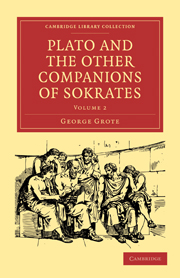CHAPTER XXVII - SOPHISTES—POLITIKUS
Published online by Cambridge University Press: 05 October 2010
Summary
Persons and circumstances of the two dialogues
These two dialogues are both of them announced by Plato as forming sequel to the Theætêtus. The beginning of the of the Sophistês fits on to the end of the Theætêtus: and the Politikus is even presented as a second part or continuation of the Sophistês. In all the three, the same interlocutors are partially maintained. Thus Sokrates, Theodôras, and Thesetêtus are present in all three: and Theætêtus makes the responses, not only in the dialogue which bears his name, but also in the Sophistês. Both in the Sophistês and Politikus, however, Sokrates himself descends from the part of principal speaker to that of listener: it is he, indeed, who by his qnestion elicits the exposition, but he makes no comment either during the progress of it or at the close. In both the dialogues, the leading and expository— function is confided to a new personage introduced by Theodôras:—a stranger not named, but announced as coming from Elea—the friend and companion of Parmenides and Zeno. Perhaps (remarks Sokrates) your friend may, without your knowledge, be a God under human shape; as Homer tells us that the Gods often go about, in the company of virtuous men, to inspect the good and bad behaviour of mankind. Perhaps your friend may be a sort of cross-examining God, coming to test and expose our feebleness in argument. No (replies Theodôrus) that is not his character. He is less given to dispute than his companions. He is far from being a God, but he is a divine man: for I call all true philosophers divine.
- Type
- Chapter
- Information
- Plato and the Other Companions of Sokrates , pp. 396 - 474Publisher: Cambridge University PressPrint publication year: 2010First published in: 1865

